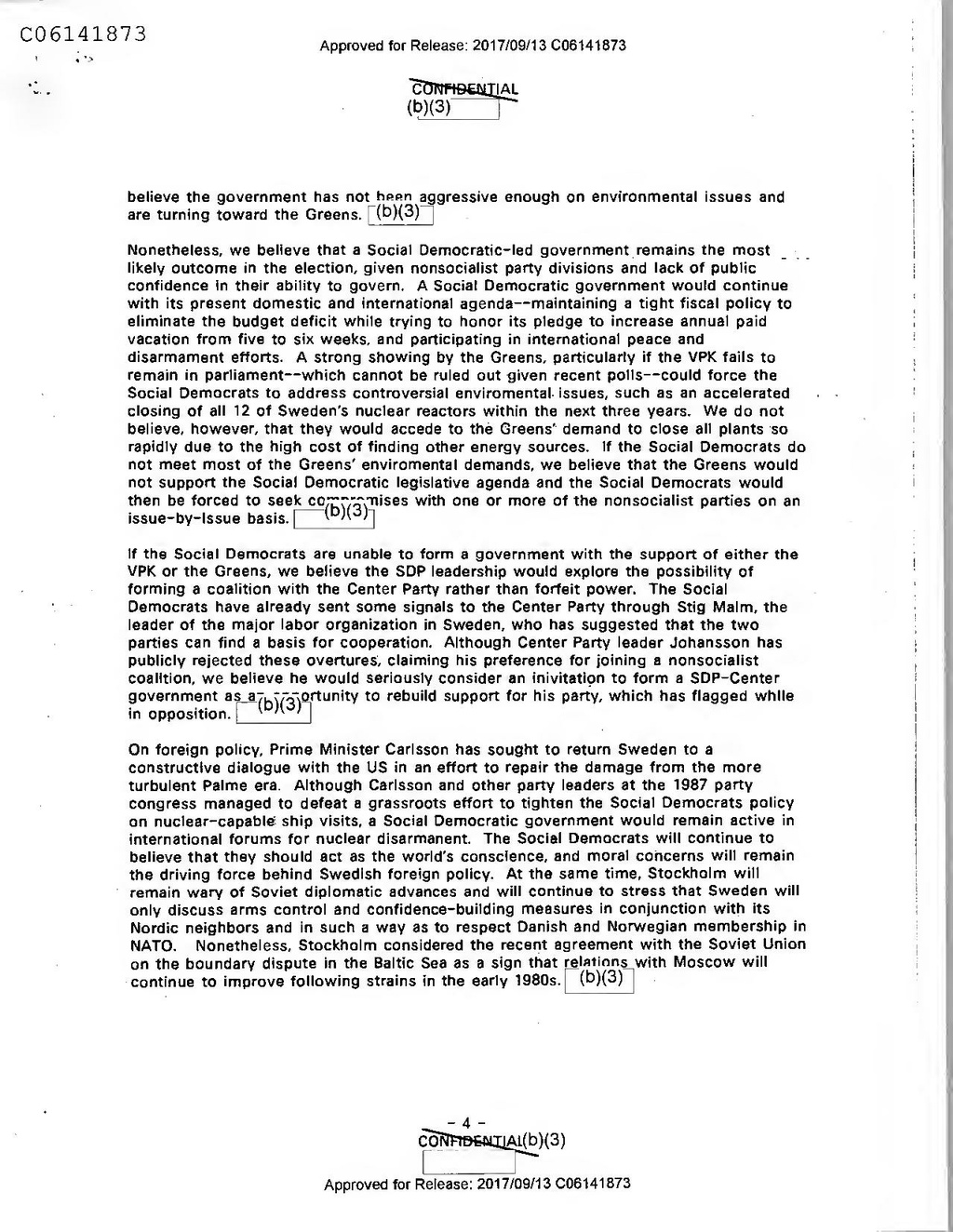CONFIDENTIAL (b)(3)
believe the government has not been aggressive enough on environmental issues and are turning toward the Greens. (b)(3)
Nonetheless, we believe that Social Democratic-led government remains the most likely outcome in the election, given nonsocialist party divisions and lack of public confidence in their ability to govern. A Social Democratic government would continue with its present domestic and international agenda--maintaining a tight fiscal policy to eliminate the budget deficit while trying to honor its pledge to increase annual paid vacation from five to six weeks, and participating in international peace and disarmament efforts. A strong showing by the Greens, particularly if the VPK fails to remain in parliament--which cannot be ruled out given recent polls--could force the Social Democrats to address controversial enviromental issues, such as an accelerated closing of all 12 of Sweden's nuclear reactors within the next three years. We do not believe, however, that they would accede to the Greens' demand to close all plants 'so rapidly due to the high cost of finding other energy sources. If the Social Democrats do not meet most of the Greens' enviromental demands, we believe that the Greens would not support the Social Democratic legislative agenda and the Social Democrats would then be forced to seek commanises with one or more of the nonsocialist parties on an issue-by-Issue basis.
(b)(3);
If the Social Democrats are unable to form a government with the support of either the VPK or the Greens, we believe the SDP leadership would explore the possibility of forming a coalition with the Center Party rather than forfeit power. The Social Democrats have already sent some signals to the Center Party through Stig Malm, the leader of the major labor organization in Sweden, who has suggested that the two parties can find a basis for cooperation. Although Center Party leader Johansson has publicly rejected these overtures, claiming his preference for joining a nonsocialist coalition, we believe he would seriously consider an inivitation to form a SDP-Center
az
government as a7b)(3)ortunity to rebuild support for his party, which has flagged whlle
On foreign policy, Prime Minister Carlsson has sought to return Sweden to a constructive dialogue with the US in an effort to repair the damage from the more turbulent Palme era. Although Carlsson and other party leaders at the 1987 party congress managed to defeat a grassroots effort to tighten the Social Democrats policy on nuclear-capable ship visits, a Social Democratic government would remain active in international forums for nuclear disarmanent. The Social Democrats will continue to believe that they should act as the world's conscience, and moral concerns will remain the driving force behind Swedish foreign policy. At the same time, Stockholm will remain wary of Soviet diplomatic advances and will continue to stress that Sweden will only discuss arms control and confidence-building measures in conjunction with its Nordic neighbors and in such a way as to respect Danish and Norwegian membership in NATO. Nonetheless, Stockholm considered the recent agreement with the Soviet Union on the boundary dispute in the Baltic Sea as a sign that relations with Moscow will continue to improve following strains in the early 1980s. (b)(3)
CONFIDENTIAL(b)(3)
Approved for Release: 2017/09/13 C06141873
